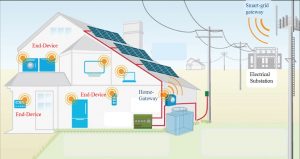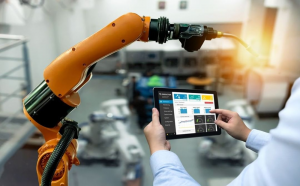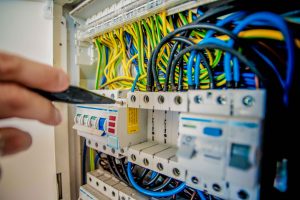Program code: 7520216
The International University – Vietnam National University, Ho Chi Minh City was established in 2003, and the School of Electrical Engineering is one of the first four majors. Oriented to the main goals, vision, and mission of the International University, the main goal of the School of Electrical Engineering is to prepare graduated students with a full package of necessary fundamental knowledge and skills to adapt to the rapidly changing technology world, especially in the fields of Electronic Engineering, Telecommunications Engineering, and Signal and Image Processing.






– Program Educational Objectives: The Control Engineering and Automation program provides:
- A solid foundation of knowledge in the design and the industrial automation control systems.
- Extensive and specialized knowledge of production lines.
- Self-study ability to grasp new technologies and necessary soft skills, ensuring students are qualified for pursuing higher study at domestic and international universities or institutes.
– Program Orientations:
- Measurement and control by computer or microcontroller.
- Design and operate the factory’s automatic production lines.
– Career opportunities:
- Working for domestic and foreign companies related to the automation and electronics fields, such as consumer goods production, food technology, agricultural and seafood processing technology, oil and gasoline, etc.
- Capable of starting a business, consulting, and providing solutions in the field of automation, automatic equipment, etc.
- Managers and technical experts working for state agencies or foreign companies.
In addition to the program objectives and career opportunities of each major, students of the Control Engineering and Automation program will be provided with the following knowledge, skills, and abilities after graduation:
1. Student Outcomes
Students of the Control Engineering and Automation program are prepared with the following knowledge, skills, and abilities:
1.1. The Knowledge of Political Theory
About the Political theory:
- The graduated students have a correct understanding of the Communist Party and the Govermnent’s policies.
- Strictly abide by the laws of the Government and the regulations of the working organizations after graduation.
- Have their respective point of view, while being able to perceive and evaluate different situations logically and positively.
About the Behavior and Ethics:
- Have good personal as well as professional ethics.
- Have a spirit of patriotism, love for other fellow countrymen, attachment, and good community service spirit.
- Have a sense of personal responsibility, as well as a responsibility to the community.
- To be proactive, positive, progressive, and creative at work.
- Have a high spirit and skills of teamwork while maintaining high professionalism.
1.2. Foreign language capability
- The students of the International University, by the time of completing their undergraduate programs, must reach an intermediate-advanced level of English proficiency. The requirement of a minimum English level of 5.5 IELTS or other certificates with equivalent scores, namely: 61 TOEFL iBT, or TOEIC (600 Listening + Reading and 270 Speaking + Writing).
- Senior students must write their respective thesis reports in English, and must successfully defend the thesis project before the Scientific Council of the School of Electrical Engineering.
- Graduated students can participate in dialogues or discussions with a relatively complete vocabulary for all situations, with a relatively good knowledge of English idioms, phrasal verbs, and colloquial words.
- Graduated students should master all areas of English grammar, and be able to present in the form of a thesis report of problems in daily life as well as in academic environments.
1.3 Qualification
After graduation, students of the Control Engineering and Automation program must meet the following requirements:
- Ability to apply knowledge of math, science, and engineering.
- Ability to design and practice experiments, as well as analyze and interpret data.
- Ability to design a system, an element, or a process to satisfy given requirements within realistic constraints such as economic, environmental, social, political, ethical, health, and safety constraints.
- Ability to work in groups.
- Ability to clarify and accurately address and solve problems in the automation control field.
- Understanding of ethical responsibility and professionalism at work.
- Ability to communicate effectively.
- Having extensive knowledge and understanding of the impact of automation control solutions in specific social, economic, and global circumstances.
- Awareness of the necessary and capacity of a lifelong learning concept.
- Knowledge of contemporary issues.
- Ability to implement skills, techniques, and modern tools to solve practical problems in the field of automation control;
- Knowledge of statistics, probabilities, and their applications in automation control; knowledge of mathematics such as differentials and derivatives, basic science, computer science, and technical knowledge sufficient to analyze and design a control hardware and/or software device or system of automation control.
- Specific advanced math knowledge, such as differential equations, linear algebra, and complex numbers.
- Working ability.
- Graduated students can work for domestic and foreign companies in fields related to automation and electronics.
- Graduated students have the knowledge and skills to design, manufacture, repair, and maintain equipment and production lines. Graduated students also have the ability to establish businesses, provide automation solutions, and automation equipment, and provide support with services – products that the businesses, society, and markets require.
- After graduation, students can become managers or technicians working for state agencies, or foreign companies.
- After graduation, students can become lecturers and researchers at relevant universities, colleges, and research institutes.
1.4. Specific objectives
- Have good political qualities and professional ethics, and live and work in compliance with the laws of the Vietnamese government.
- Acquire basic knowledge in the general field of automation and control engineering, in both theoretical and application aspects.
- Ability to solve interdisciplinary technical, social, political, and economic problems.
- Have problem-solving skills to analyze and design engineering systems or industrial processes.
- Capable of designing, developing, and integrating information systems for practical applications.
- Have a strong awareness of professionalism, work ethics as well as teamwork, leadership, and management skills.
- Conscious of environmental protection, design and operate environmentally friendly systems.
2. Lecturers and Researchers
Currently, the School of Electrical Engineering is composed of 19 members, including 1 Associate Professor, 12 Ph.D., and 6 Master of Engineering who are actively teaching courses. The details information about the Lecturers – Researchers, their respective research orientations, and contact information, are provided at the following link:
3. Laboratories
Thanks to investment from the government projects, the World Bank, and the International University, the School of Electrical Engineering currently possesses a system of modernized and high-standard laboratories. Currently, the School operates 6 laboratories and 1 mechanical – electrical workshop:
| No. | Laboratories | Location | Area |
| 1 | Advanced RF & Microwave Laboratory | LA2-109 | 90m2 |
| 2 | Electronics Laboratory | LA2-201 | 96m2 |
| 3 | Telecommunication Laboratory | LA2-202 | 96m2 |
| 4 | Signal Processing Laboratory | LA2-207 | 60m2 |
| 5 | Embedded – System Laboratory | LA2-208 | 60m2 |
| 6 | Automation Laboratory | LA2-210 | 60m2 |
| 7 | The workshop | The Aquarium Resources compound | 45m2 |
4. Contact information
School of Electrical Engineering – Office O2.206
Tel: (+84) 283 7244 270 – Ext: 3221
